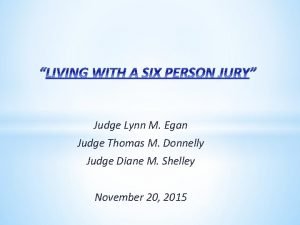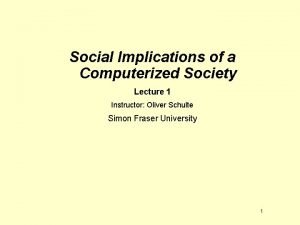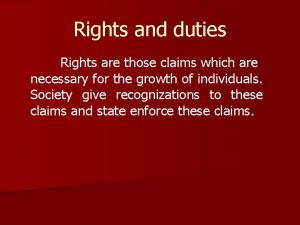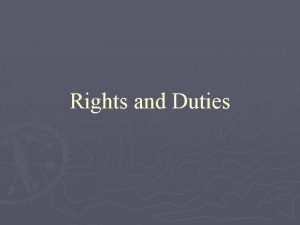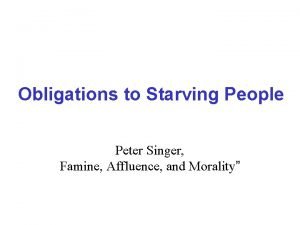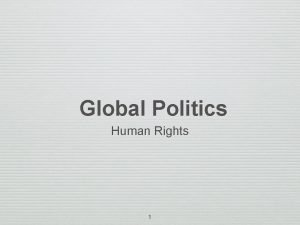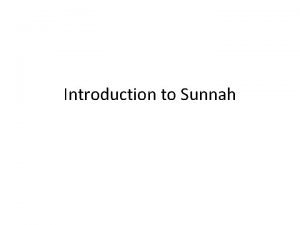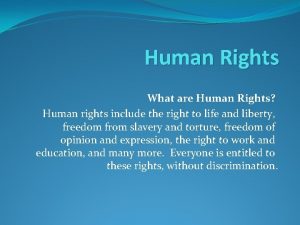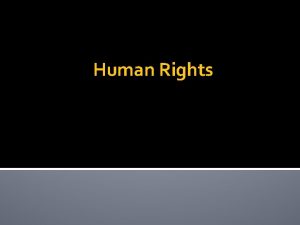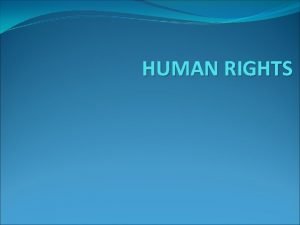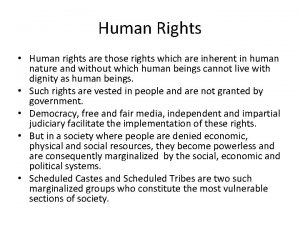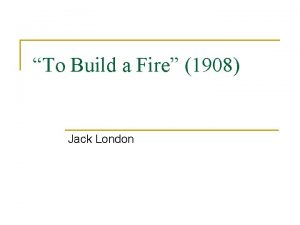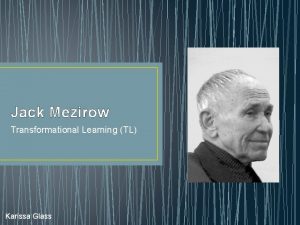HUMAN RIGHTS Jack Donnelly Human rights are literally





















- Slides: 21

HUMAN RIGHTS Jack Donnelly

• Human rights are, literally, the rights we have simply because we are human. • They are equal rights: One either is or is not a human being, and thus has exactly the same human rights as every other human being. • They are inalienable rights: One cannot stop being a human being, and therefore cannot lose one’s human rights, no matter how horribly one behaves nor how barbarously one is treated. • Human rights are also universal rights, held by every human being, everywhere.

The Practice of Human Rights • Human rights are a complex and contested social practice that organizes relations between individuals, society, and the state around a distinctive set of substantive values implemented through equal and inalienable universal rights.

1. 1 Human Rights as Rights • ‘‘Right’’ has two principal moral and political senses, rectitude and entitlement, characteristically expressed in talk of something being right (or wrong) and someone having a right. • Denying you something that it would be right for you to enjoy in a just world is very different from denying you something— even the same thing—that you have a right to enjoy. • Claims of rights ordinarily ‘‘trump’’ utility, social policy, and other grounds for action. • And you can do special things with rights.

• Exercising rights is cumbersome and costly both to the parties and to society. It is thus to be avoided when possible. • Nonetheless, the power to claim rights distinguishes having a right from simply being the (rights-less) bene. Wciary of someone else’s obligation. • ‘‘Having’’ (possessing) a right is of special value precisely when one does not ‘‘have’’ (enjoy) the object of that right. • Possessing a right must not be confused with the respect it receives or the ease or frequency with which it is (or is not) enforced.

• Having a human right also should not be confused with enjoying the substance or object of that right. • Even active protection may have nothing to do with a • right (title) not to be executed. • Rulers may, for example, act out of a sense of justice, instrumental calculations, or a divine injunction that does not endow subjects with rights. • And even a right not to be executed arbitrarily may rest on custom or statute rather than being human.

• Human rights, as we shall see below, principally regulate relations between individuals, conceived of as citizens, and ‘‘their’’ state. • But as rights (entitlements) they do more than establish standards of political legitimacy. • They authorize and empower citizens to act to vindicate their rights. • Human rights are not just abstract values such as liberty, equality, and security. • They are rights, entitlements that ground particular social practices to realize those values.

1. 2 The Source and Substance of Human Rights How being human gives rise to rights. what in (our) ‘‘nature’’ gives us ‘‘natural rights? ’’ Needs is a frequent answer. how needs give rise to rights is obscure. A closer examination suggests that human rights rest on our moral nature. • They are grounded not in a descriptive account of psycho-biological needs but in a prescriptive account of human possibility. • • •

• Human rights constitute individuals as a particular kind of political subject: • free and equal rights-bearing citizens. And by de. Wning the requirements and limits of legitimate government, they constitute states of a particular kind.

• Contemporary international human rights law presents one politically important vision of this process. There is a surprising degree of international consensus—at least at the interstate elite level—on the list of rights in the • 1948 Universal Declaration of Human Rights and the 1966 International Human Rights Covenants. • As of December 2005, the International Covenant on Economic, Social, and Cultural Rights had 151 parties and the International Covenant on Civil and Political Rights had 154 parties, representing 80 percent of the total UN membership.

• These two documents can be read as envisioning the mutual co-constitution of equal and autonomous citizens and democratic states fit to govern such rights-bearing citizens • The state must treat its citizens not just with concern for their capacity to suffer and respect ‘‘as human beings who are capable of forming and acting • on intelligent conceptions of how their lives should be lived, ’’ but with equal concern and respect

1. 3 Justifying Human Rights • Human rights are absent from the traditions of Western moral theory. • Even today, general justifications of human rights are peripheral to most theoretical discussions. • Kant assumes rather than argues for the existence of these rights. • Although human rights do not depend on any particular religious or philosophical doctrine, they are incompatible with fundamentally inegalitarian comprehensive doctrines.

1. 4 Duty-bearers of Human Rights • Henry Shue argues that most rights, and all human rights, entail three kinds of duties: not to deprive the right-holder of the enjoyment of her right; to protect against deprivation; and to aid those whose rights have been violated. • These duties, however, may be held by different actors. • The rights of children in all societies are implemented primarily through families. • In Singapore, children have certain legal obligations to support their aged parents.

• Regional and international organizations acquire obligations to implement and enforce human rights. • In practice, however, virtually all human rights today are implemented and enforced by states operating within recognized territorial jurisdictions. • Although the holders of human rights are universal, implementation and enforcement lie with states, which have duties to protect and aid only their own citizens (and certain others under their territorial jurisdiction).

A History of Human Rights • In the Western and non-Western worlds alike, politics and society typically have been organized on hierarchical rather than egalitarian principles, around duties rather and rights, and around ascribed roles rather than individuals. • Human rights are a ‘‘modern’’ invention initially developed in seventeenth- and eighteenth-century Europe and North America. • The history of human rights is the story of the (often violent) struggles through which political communities in the modern world have constructed a particular vision of the political requisites of a life of dignity worthy of a human being.

2. 2 Expanding the Scope of Natural Rights • Although natural rights were prominent in seventeenth-century British political debates, the Bill of Rights (1689) refers principally to ‘‘ancient rights and liberties’’ and the powers and prerogatives of Parliament. • The American and French Revolutions were more genuinely revolutionary, rooting sovereignty in the people and, in their still famous declarations, basing political legitimacy explicitly on equal natural rights.

• These projects too were, in practice, limited by, for example, slavery, the exclusion of women, and a (reduced but still significant) property qualification for voting. • nineteenth-century claims of human rights grew steadily more radical. • And they increasingly were advanced by the popular and working classes, now not only against royal and aristocratic privileges but • also against the bourgeois beneficiaries of previous natural rights claims.

• This change is often presented as a shift in focus from civil and political rights to economic and social rights • nineteenth-century radicals and progressives agitated as strongly for an extension of the franchise and equal civil and political rights as for new economic and social rights.

2. 3 Internationalizing Human Rights • As the case of the nineteenth-century working class suggests, dominant understandings of human rights have evolved primarily through new groups demanding full political recognition of their equal humanity by creating rights-based remedies to the distinctive ‘‘standard threats’’ to their dignity. • The twentieth century saw notable progress in recognizing and responding to discrimination against women and racial and ethnic minorities. • It also introduced the victims of Western colonization into the ambit of human rights through the right of peoples to self-determination.

• In many ways, however, the most radical twentieth-century innovation was the crafting of a system of global human rights norms. • The Universal Declaration presents itself as ‘‘a common standard of achievement for all peoples and all nations, ’’ an aspiration given some real practical significance by the development of international human rights law.

• There remain marginalized and despised groups (e. g. the disabled and homosexuals) whose claims to equal rights continue to be denied. • National implementation of international human rights norms excludes many from effectively enjoying their human rights because of accidents of birth. • The logic of universality, however, continues to be a powerful critical resource for combating exclusionary understandings and implementations.
 Antigentest åre
Antigentest åre Oscar donnelly
Oscar donnelly Turing tumble simulator
Turing tumble simulator Judge donnelly cook county
Judge donnelly cook county Alexis donnelly
Alexis donnelly What is unique about mr. donnelly's house?
What is unique about mr. donnelly's house? Main characters of jack and the beanstalk
Main characters of jack and the beanstalk Positive rights vs negative rights
Positive rights vs negative rights Littoral rights.
Littoral rights. Duties towards self
Duties towards self Legal rights and moral rights
Legal rights and moral rights What is negative right
What is negative right Positive vs negative rights
Positive vs negative rights Negative rights vs positive rights
Negative rights vs positive rights Positive rights and negative rights
Positive rights and negative rights Literally means rebirth
Literally means rebirth French word which means rebirth,
French word which means rebirth, Literally meaning of hadith
Literally meaning of hadith Photography was literally defined as
Photography was literally defined as The phrase “quantum meruit” literally means
The phrase “quantum meruit” literally means Laughed my head off meaning
Laughed my head off meaning Negative feedback homeostasis examples
Negative feedback homeostasis examples



